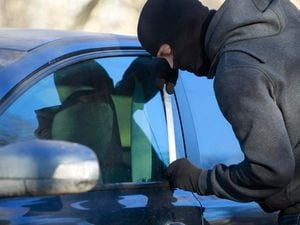Call to ban car key gadgets as thefts rise by nearly 20 per cent
Car thefts in the region increased by nearly a fifth last year according to the latest police recorded crime figures.

The rise in the number of cars with 'keyless' entry is thought to have been a major factor in the increase, which saw one in every 1,000 residents in the force have their vehicles stolen.
Between April 2017 and March this year 1,299 vehicles were stolen in the force area, according to data from the Home Office.
That is an increase of 19 per cent on the previous year, when 1,096 thefts were recorded.
The rise is higher than neighbouring Dyfed-Powys, where the number of thefts rose by 12 per cent, and is also above the average for England and Wales of 15 per cent.
Police and motoring campaigners have said this is probably due to a rise in keyless car thefts.
Radio transmitters
A spokesman from the Association of British Insurers said that criminals are exploiting the vulnerabilities of the entry system by using pairs of radio transmitters to capture the signal from the vehicle’s fob, among other methods.
He added: "The theft risk will be one of many factors taken into account by insurers when assessing the price of your motor insurance policy.
"In recent years the average cost of motor insurance has been rising – in 2017, the average motor premium paid rose by nine per cent on 2016 to a record high."
West Mercia suffered from 78 cases of aggravated vehicle taking, where stolen vehicles are driven dangerously on the road or causing an accident.
Police also recorded 3,844 incidents related to thefts from vehicles, either of personal belongings, radios or other items, an increase of 2.7 per cent from the previous year.
There were 865 crimes where the vehicle was damaged as part of an attempted theft, where the intent of the offender was not obvious.
About 70 per cent of vehicle-related thefts occurred at home and during the evening or night.
The Office for National Statistics said that 43 per cent of perpetrators entered the vehicle through an unlocked door, while breaking in through car windows has become less common in recent years.
Loophole
Mike Hawes, chief executive of the Society of Motor Manufacturers & Traders, called for action to close a loophole that allows people to buy electronic devices which can ‘read’ the codes of electronic entry systems which feature on many modern cars.
The devices are advertised online from as little as £40.
Mr Hawes said: “Manufacturers are investing billions in ever more sophisticated security features and software updates on an ongoing basis.
“However, we continue to call for action to stop the open sale of equipment which helps criminals steal cars – equipment which has no legal purpose – and have written to the Home Secretary seeking a meeting to agree how this can be addressed.”
Police have also warned about the importance of keeping keys safe from burglars after a recent spate of thefts in the Shifnal area. Last month three vehicles were stolen from the Shifnal area over a single weekend.
The culprits got into properties through an insecure door or window before taking the keys to the cars.
Shropshire’s local policing commander, Superintendent Jason Wells said: “We want people to think about what they do with their car keys when they get home, it can be convenient to leave them near the door but this can make it easy for burglars.”
Organised crime link to burglaries
A Shropshire police chief said there were growing links between car thefts and organised crime.
Supt Tom Harding, police commander for Telford & Wrekin, is also head of the West Mercia’s We Don’t Buy Crime Team, which was set up to reduce the number of burglaries and high-value thefts across the force.
Mr Harding said: “For many years we have seen significant reductions in this crime type which includes cars, agricultural and commercial vehicles,” he said.
“We understand the impact a vehicle theft has on the victim, their daily lives and their livelihoods.
“As vehicles have become better designed criminals have resorted to more sophisticated methods to steal them and we are increasingly seeing links between vehicle thefts and serious and organised crime.
"We are working hard to robustly tackle organised crime groups, putting a stop to their activity.”
Mr Harding said over the past few years the force had worked in partnership with local communities and the police and crime commissioner in the creation of We Don’t Buy Crime areas.
These areas see residents encouraged to mark their property with SmartWater, a liquid which is only visible under ultra-violet light.
“If someone comes into contact with it, it transfers on to their clothing and skin and can often place a thief at the scene of the crime or in possession of stolen property,” said Mr Harding.
He added that towns and villages taking part in the scheme had clear signs warning thieves that the town had taken crime-prevention methods.
However, Mr Harding said there were also many simple ways of reducing car crime.
“It is normally the very basic crime prevention measures that still apply and we would always advise people to make sure they double check their vehicle is locked before they leave it unattended, that their keys are stored somewhere safe in the house preferably away from the front door,” he said.





